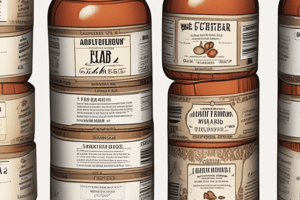Podcast
Questions and Answers
What is the principal aim of the General Food Regulations (NI) 2004?
What is the principal aim of the General Food Regulations (NI) 2004?
The principal aim of the General Food Regulations (NI) 2004 is to protect human health and consumers' interests in relation to food.
Which of these options are considered factors to be taken into account when determining if food is injurious to health?
Which of these options are considered factors to be taken into account when determining if food is injurious to health?
- The normal conditions of use of the food, such as cooking. (correct)
- Food can be rendered unfit through contamination, foreign objects, unacceptable taste or odour, or decay/decomposition.
- The central concept of unfitness is unacceptability.
- The particular health sensitivities of specific categories of consumers where the food is intended for that category of consumers. (correct)
The Food Hygiene Regulations (NI) 2006 apply to high-risk foods only.
The Food Hygiene Regulations (NI) 2006 apply to high-risk foods only.
True (A)
The Food Hygiene Regulations (NI) 2006 are made under the ______ Act.
The Food Hygiene Regulations (NI) 2006 are made under the ______ Act.
What are the main offences created under the Food Safety (NI) Order, 1991?
What are the main offences created under the Food Safety (NI) Order, 1991?
What penalties may be imposed for non-compliance with the General Food Regulations (NI) 2004?
What penalties may be imposed for non-compliance with the General Food Regulations (NI) 2004?
What is the meaning of 'traceability' in the context of food safety?
What is the meaning of 'traceability' in the context of food safety?
What are the key measures that food business operators are required to take in case of food safety concerns?
What are the key measures that food business operators are required to take in case of food safety concerns?
What is the difference between 'withdrawal' and 'recall' in the context of food safety?
What is the difference between 'withdrawal' and 'recall' in the context of food safety?
What role do 'hygiene improvement notices' and 'hygiene prohibition orders' play in enforcing food hygiene regulations?
What role do 'hygiene improvement notices' and 'hygiene prohibition orders' play in enforcing food hygiene regulations?
What type of food is the Food Hygiene Regulations (NI) 2006 particularly focused on?
What type of food is the Food Hygiene Regulations (NI) 2006 particularly focused on?
Food business operators are required to keep records of sales to the final consumer according to traceability regulations.
Food business operators are required to keep records of sales to the final consumer according to traceability regulations.
The Food Hygiene Regulations (NI) 2006 lay down rules for all food businesses, encompassing every stage of the food chain.
The Food Hygiene Regulations (NI) 2006 lay down rules for all food businesses, encompassing every stage of the food chain.
Flashcards
General Food Regulations (NI) 2004
General Food Regulations (NI) 2004
Protect human health and consumer interests related to food. Applies to all stages of food production, processing, and distribution.
Food Hygiene Regulations (NI) 2006
Food Hygiene Regulations (NI) 2006
Rules for all food businesses, ensuring effective and proportionate controls throughout the food chain.
Food Business Operators' Responsibilities
Food Business Operators' Responsibilities
Ensure food is safe, labeling/advertising isn't misleading, maintain traceability records, and withdraw unsafe food from the market.
Traceability
Traceability
Signup and view all the flashcards
Unsafe Food
Unsafe Food
Signup and view all the flashcards
Misleading Food Labeling
Misleading Food Labeling
Signup and view all the flashcards
Food Withdrawal
Food Withdrawal
Signup and view all the flashcards
Food Recall
Food Recall
Signup and view all the flashcards
Penalties for Non-Compliance
Penalties for Non-Compliance
Signup and view all the flashcards
Study Notes
Consumer Law Modulecst 107
- General Food Regulations (NI) 2004 and Food Hygiene Regulations (NI) 2006 cover food safety and consumer protection.
- Recap of Week 8 includes offences, penalties, and possible defenses under the Food Safety (NI) Order 1991.
- EU Food Safety Regulations place responsibility on food business operators for producing safe food, including clear responsibilities, proportionate controls, and a risk-based approach (farm to fork).
- General Food Regulations 2004 aim to protect human health and consumer interests throughout the entire food production process (from farm to consumer).
Food Business Operator Responsibilities
- Ensure food is safe (not injurious to health or unfit for consumption).
- Ensure labelling, advertising, and presentation of food does not mislead consumers.
- Ability to trace food products, ingredients, and animals by identifying suppliers and buyers with details available on demand (traceability).
- Withdraw unsafe food from the market and inform authorities (e.g., Food Standards Agency and local councils) about this.
- Provide consumers with reasons for withdrawal when needed (recall unsafe food already supplied).
- Ensure food is not harmful by carefully considering normal conditions of use, health sensitivities of specific consumer groups (such as gluten-free foods), and if the food is unacceptable due to contamination, foreign objects, unacceptable taste/odour or decay/decomposition.
Food Misleading Consumers
- Offences can occur, when statements are untrue, or food pictures are misleading.
- Offences cover correct but misleading information which misleads consumers.
- Misleading information applies to situations involving consumers and other businesses.
Traceability
- Traceability records should be available on demand, including supplier names, addresses, transactions, and delivery dates.
- Food retailers are not required to keep records of individual sales to consumers.
- Traceability follows a food, feed, animal or substance from production through all stages (e.g. processing and distribution).
Withdrawal of Unsafe Food
- Withdraw unsafe food from the market, and notify authorities (Food Standards Agency and local councils).
- If unsafe food has reached consumers, inform them (with details of the reason for withdrawal) and where necessary, recall unsafe food already supplied.
Other Measures for Health Protection
- Withdrawal is the process of removing a food item from the market (includes steps and actions by producers, processors, wholesalers etc).
- Recall is where consumers are advised to return goods.
Penalties
- Non-compliance can result in fines and/or imprisonment in both Crown and Magistrates Courts with various minimums and upper limits.
General Food Regulations (NI) 2004 Summary
- Imported and exported food must meet EU law requirements.
- Food businesses must not offer unsafe or non-compliant food for sale.
- Labelling, advertising, and presenting food should not mislead consumers.
- Record keeping for traceability is important.
- Food businesses have to take appropriate action if food-items are not compliant and inform the authorities.
Implementation of EU Regulations in Northern Ireland
- Food Hygiene Regulations (NI) 2006 are related to the Food Safety Act and address the general requirements for food.
- These regulations cover food hygiene throughout the process from farm to customer.
- Rules are aimed at all food businesses, and apply efficient and proportionate controls.
Food Hygiene Regulations (NI) 2006 Summary
- Food hygiene laws are closely linked to food law.
- These laws establish rules for all food businesses to ensure the safety of food from production to sale to consumers.
Studying That Suits You
Use AI to generate personalized quizzes and flashcards to suit your learning preferences.




